
Studying Medicine
Should I choose medicine?
With so many different paths, choosing a career can feel overwhelming.
Take some time to think about yourself – your interests, your strengths, your personality.
- Are you naturally curious and love learning?
- Can you adapt quickly to new situations and technologies?
- Are you motivated, compassionate and community-minded?
- Do you love to be challenged and solve problems?
- Do you want to work as part of a team?
- Do you want diverse career opportunities?
Medi-Nav is Queensland Health’s medical careers website and can help you explore medicine as a career – from initial study requirements through to specialty training pathways and working as a doctor in Queensland.
How do I qualify to work as a doctor?
In Queensland, there are two avenues to take if you are interested in studying medicine after high school:
- Undergraduate degree followed by a postgraduate Doctor of Medicine (MD), or
- Bachelor of Medicine, Bachelor of Surgery (MBBS)
The institution you choose and whether you are a domestic or international student, will impact the overall cost of your medical degree.
- In Australia, most domestic students studying medicine are entitled to a Commonwealth supported place (CSP) which provides reduced course fees.
- A domestic medical student with a CSP is liable to pay a contribution, while the Australian Government pays the difference. The student contribution amount can be paid upfront or through a HECS-HELP loan.
- International and some domestic students (e.g. at private universities), can apply for a full fees-paying place. Fees are set by the university.
IMPORTANT FOR REGIONAL, RURAL & REMOTE STUDENTS:
The Australian Government is currently prioritising ensuring access to studying medicine in regional, rural and remote parts of Australia. Visit Access and Participation – Department of Education, Australian Government for more information on:
- Demand Driven Funding for all First Nations Australians
- Regional University Study Hubs program
- National Regional, Rural and Remote Tertiary Education Strategy
- Rural Access Scheme (RAS), which allows eligible applicants to have their ATAR rank boosted by 2 ranks upon applying for their eligible program.
There are four universities in Queensland who provide these medical degree options:
| Institution | Duration | Course Type | Subject Prerequisites | Entry Requirements | Location | Rural Access Scheme |
 |
4 years 8 mths | Undergraduate Bachelor of Medical Studies, Doctor of Medicine | English (Units 3 & 4 at Grade C or better) | Minimum ATAR 96.75, psychometric testing | Gold Coast | Not available |
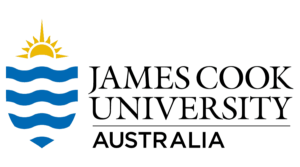 |
6 years | Undergraduate MBBS | English (3/4, C); Mathematical Methods (3/4, C); Chemistry (3/4, C) | ATAR 91.65-99.95 | Townsville or Cairns | RAS available |
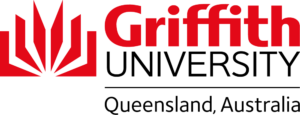 |
4 years | Postgraduate MD | – | Any Bachelor Degree with min GPA 5.0 and overall score of 50+ in GAMSAT test | Gold Coast or Brisbane (Nathan) | RAS available |
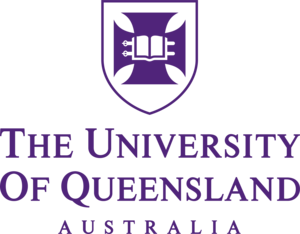 |
4 years | Postgraduate MD | Two science prerequisites in cell and tissue biology, and systems physiology at 2nd year undergrad level | Any Bachelor Degree with min GPA 5.0 and overall score of 50+ in GAMSAT test | Brisbane (Herston or St Lucia) | RAS available |
Additionally, the Regional Medical Pathways (RMP) are available to those based in Central Queensland and Wide Bay, and Darling Downs and South West regions which provide an undergraduate pathway to the University of Queensland’s MD program.
| Institution | Duration | Course Type | Subject Prerequisites | Entry Requirements | Location | Rural Access Scheme | |
| Regional Medical Pathway for Central QLD and Wide Bay Regions | |||||||
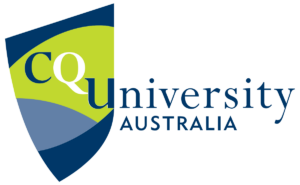 |
3 years | Undergraduate Bachelor of Medical Science | English (3/4, C); Mathematical Methods (3/4, C); Biology, Chemistry or Physics (3/4, C) | Minimum ATAR 95.00, competitive UCAT ANZ score. | Bundaberg or Rockhampton | RAS available | |
| Regional Medical Pathway for Darling Downs and South West Regions | |||||||
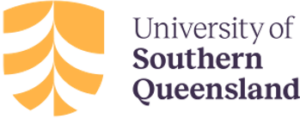 |
3 years | Undergraduate (Bachelor of Biomedical Sciences) | English (3/4, C); General Mathematics, Mathematical Methods or Specialist Mathematics (3/4, C). Recommended Biology, Chemsitry or Physics (3/4, C). | Minimum ATAR 95.00 | Toowoomba | RAS available | |
For further information on individual course information, including specific eligibility requirements, please contact the relevant institution via the weblinks above.
The below diagram provides a general idea of what a medical pathway may look like from start to finish:
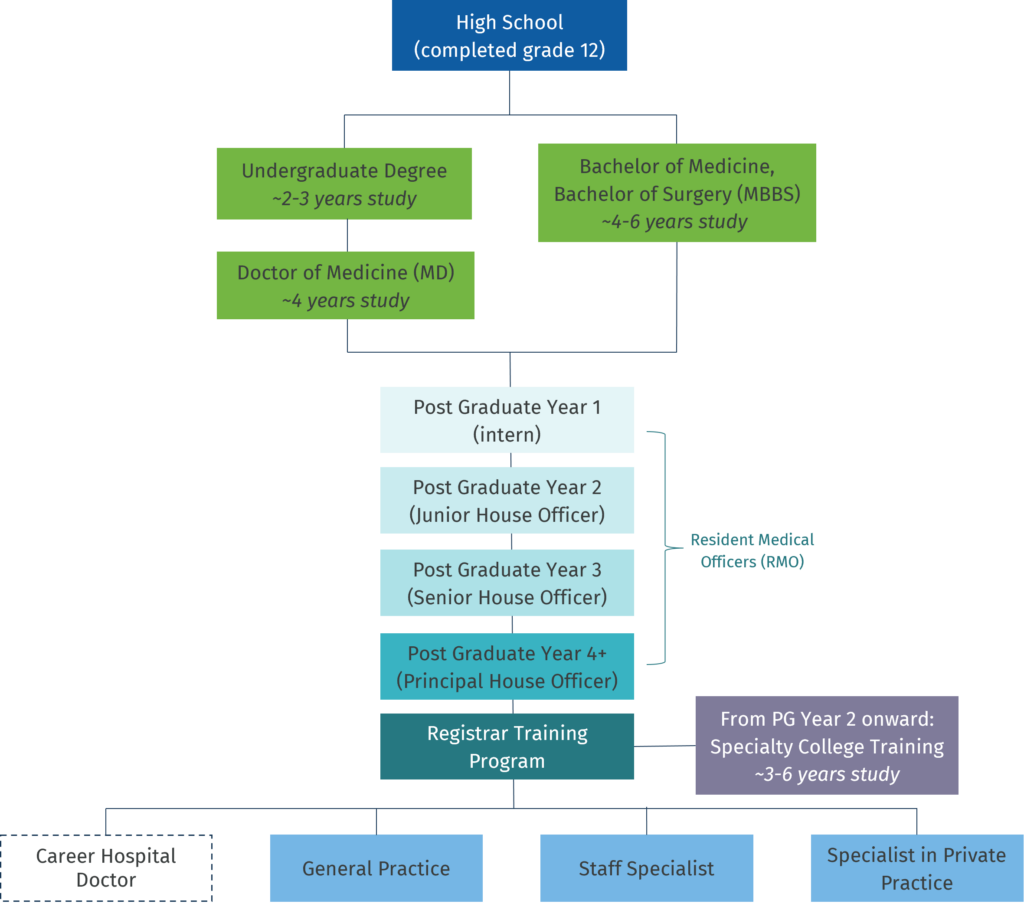
What does a doctor do?
After you graduate university you continue to ‘learn on the job’ in your early post-graduate years and consolidate all your academic learning in university. These are your ‘prevocational years’ i.e the period between graduating and transitioning to specialty training.
Prevocational Training:
The new National Framework for Prevocational Training sets a national standard to support a formalised training program for the first two years after graduation. This is to ensure you get the best learning experiences across a range of settings to ensure a more supported transition to your medical career.
- You will complete paid positions as an intern, junior house officer and senior house officer, respectively, where you will do rotations that will expose you to different specialties.
- Queensland Health also offers principal house officer roles, which are generally within a specific specialty. These roles are for those who are not on a college-accredited vocational training program.
Registrar/Specialty Vocational Training:
- Vocational training starts once you’ve decided on the specialty you want to pursue and have successfully gained a place on a training program.
- This training is managed by the respective medical specialty colleges, and will have you work in a job as a registrar as you follow the requirements of the college’s program.
Once you have completed your college requirements, you can be awarded a fellowship of the college and then work independently as a specialist in that field.
Working as a doctor in Queensland Health?
Everyone has their own definition of a great job. We’ll pay you a competitive salary, offer generous leave benefits and help you build your superannuation savings. But that’s just the beginning.
Queensland Health offers medical graduates:
- Guaranteed intern places within Queensland Health facilities for domestic graduates of Queensland universities.
- State-wide recruitment campaigns to assist managing recruitment across intern, resident medical officer (RMO), and registrar years.
Our commitment to work-life balance and flexibility goes beyond mere policy. We recognise that our team members have responsibilities outside of work, whether it’s caring for loved ones, pursuing education, or managing personal commitments. We value your life beyond Queensland Health.
We offer opportunities to help everyone learn, thrive, grow and achieve every day, whether you’re just starting your career, learning new skills or helping others:
- Management, leadership and executive leadership programs
- Graduate Certificates and tailored management development programs such as the Leading Health Service Innovation Program and Step Up Clinician Leadership Program
- Ongoing career succession planning meetings to discuss development and opportunities
- Coaching, shadowing and mentoring programs
How can Medi-Nav help me?
Medi-Nav has been developed to be a useful tool for prospective and current medical students and junior doctors to explore their career options early using updated Queensland-specific specialist and trainee workforce data across a wide range of specialties.
One of the useful tools Medi-Nav provides is the Comparison Tool, which allows you to compare different medical specialties side by side. This can help you understand the opportunities available in your medical career and help you make informed choices.
Some things you might want to consider when searching through Medi-Nav:
- What aspects of medicine are you most interested in doing?
- What are the steps to become qualified?
- Where would you like to work?
Medi-Nav is designed to help you make an informed career decision. We hope you enjoy navigating through the many opportunities a career in medicine offers. Perhaps you’ll discover the career for you and be part of the next generation of Queensland Health doctors!

